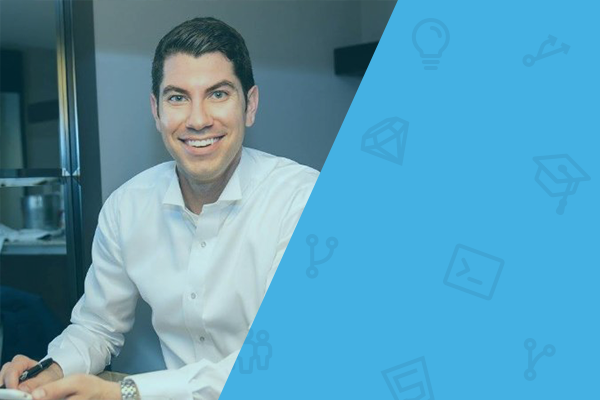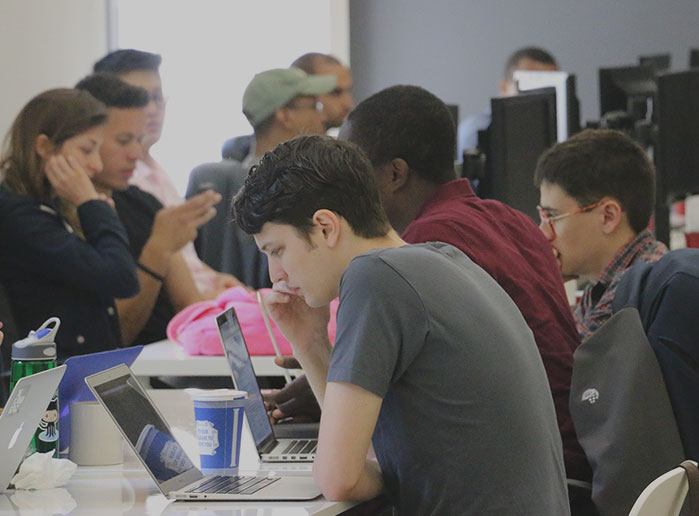What do you when you work your way into the industry of your dreams, but find that the technology is way behind the times? For Flatiron School alum Charlie Tafoya, you build it yourself. After working for years in private capital markets, Charlie learned to code and launched Chronograph – a company providing the technology he thought was missing from the industry. Read on for Charlie’s story and his advice for new programmers.
Thanks for stopping by! First, can you let us know what were you pursuing prior to web development?
I started my career in Global Real Estate Investment Banking at Merrill Lynch. I’ve always been a technology geek, so even there I managed to carve out a tech niche covering data centers. Following this and prior to Flatiron, I was a private equity investor for several years at Pantheon Ventures, one of the largest global fund of funds. It was this experience that gave me insight into the need for better technology across private capital markets and the impetus to found Chronograph.
What insights into the existing tools did you discover there that drove you to want to build something new?
During my time at Pantheon, I had the opportunity to see across hundreds of private equity funds as a secondaries investor. A few things stood out – one, private equity investors now have more data than ever; two, they were making use of that data, but using inefficient processes and tools; and three, modern cloud technology was really coming into its own in other industries. Hence, an enormous opportunity to bring the same to private capital markets.
And what brought you to Flatiron School to pursue that?
For me, there was really no choice other than Flatiron School. The program’s prestige, reputation, and rigor stood in stark contrast to other options. It was particularly the ‘sink or swim’ approach that I found hugely motivating. I had a singular goal in learning modern web frameworks at Flatiron – to get from 0 to 100 as fast as possible, understand the options available to leading developers, and develop the applied skill set necessary to lead a technology team.
What was your favorite part of the Flatiron School experience?
Every day of the program, there’s an overriding focus: learn to code (“learn, love, code” in the Flatiron mantra). Everyone in my cohort was driven to consume as much information as possible, and I really loved the diversity of backgrounds that were part of my peerset. There’s no one “type” of personality in Flatiron cohorts, and I give the school a lot of credit for very consciously building diverse classes. The shared traits among students are their hunger to learn and genuine passion for technology – this passion helped us all get through the difficult points.

Tell me more about Chronograph. What are your offerings? What are you doing that didn’t exist in this space before?
Chronograph was founded with the mission of bringing exceptional technology to private capital markets.
Today, our product suite includes diligence, monitoring, and reporting solutions for institutional investors. At their core, these tools help eliminate repetitive manual processes and inform decisions with better data and analytics.
In addition to a unique approach to structuring private capital data, our platform provides analytical capabilities far beyond what’s offered in incumbent solutions. Part of our advantage is both myself and my co-founder (an MIT-trained developer) are former private equity investors, so we’re able to translate finance methodologies directly into code alongside our wider dev team.
What was it like launching your own product/company? Have you run into any challenges?
There are always challenges with introducing a new approach, but we’ve been humbled by the support and traction we’ve received across the private capital landscape. It seems that institutions have realized the need for better technology, and understand that what we’re doing in this regard is highly differentiated.
The main thing we look for is a hunger to learn. We’re a highly self-directed development team, so it’s important that developers have a good sense of how their changes affect the overall code base, but that they don’t stop trying to apply new ideas, concepts, or fundamental tech. Our top concern is to avoid resting on success or thinking that we’re done innovating.
For us, it’s all about making sure that each new customer has a hand-in-glove experience. We’re going to keep innovating and doing everything we can to be a leading technology operating partner, and we’re excited for the future of this market and our company.
As you grow your company, what are you looking for in the new developers you’re hiring? Where are you looking for talent?
The main thing we look for is a hunger to learn. We’re a highly self-directed development team, so it’s important that developers have a good sense of how their changes affect the overall code base, but that they don’t stop trying to apply new ideas, concepts, or fundamental tech. Our top concern is to avoid resting on success or thinking that we’re done innovating. We look for developers who understand what that means day-to-day, and we’ve built a great team around those organizing principles.
We’ve continued to tap Flatiron School alumni to join our development team (we’ve hired two outstanding full-time developers who got their start at Flatiron School). The fact that the school has continually updated its curriculum means that we have access to top talent trained on the latest tools, and allows us to stay relevant in the constantly changing world of modern frameworks.
[irp posts=”2914″ name=”Get Flatiron School’s Entrepreneur Resources Pack”]Any advice current new programmers/Flatiron students on learning to code?
This is related to the prior question, but don’t stop learning. Push yourself. At Flatiron we were coding 14+ hours per day, every single day. We try to maintain a more sustainable pace at our company, but we have pushed ourselves to constantly learn and embrace new tech at every opportunity. There are so many resources available that there’s really no excuse. Try out a new language, a new framework, a new library, or just refresh your understanding of your existing tech. That’s the difference between a decent and great dev.
And good luck to all current students!
What will you build when you learn to code? Get started today with Flatiron School’s free Bootcamp Prep course.
Written byJOSH HIRSHFELD
Content Marketing Manager, Flatiron School

